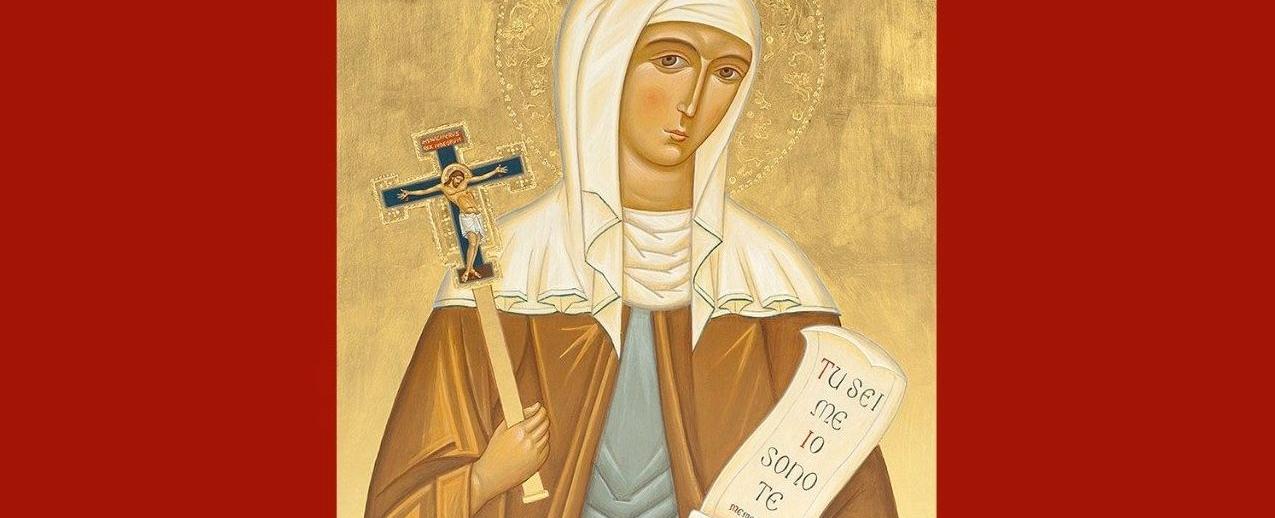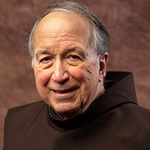Saint Angela of Foligno: Franciscan Mystic

On January 4, Franciscans, especially the Third Order, both Secular and Regular, celebrate the memory of the great mystic, Saint Angela of Foligno (c. 1248–1309). In the USA, she is remembered on January 7.
Early life comfortable, carefree
Angela was born into a well-to-do family in the town of Foligno, Umbria, Italy, only a short distance from Assisi, and was married as a young woman. Her early life was comfortable, indeed carefree and superficial; in fact, she dismissed people who were seriously committed to religious activities.
Vision of Francis spurs Angela to redirect her life
When she was in her late 30s, however, she had a vision of St. Francis that caused her to start examining her life. Especially after the death of her family in a plague in 1288, she totally redirected her life, formally joining the Brothers and Sisters of Penance (Franciscan Third Order) in 1291.

Church of San Francesco in Foligno, where Angela frequently worshiped
Angela records her intense mystical journey
In the years that followed, her friar spiritual director asked permission to record her increasingly intense mystical journey. Angela devoted herself to prayer and the care of the sick and the poor, becoming the center of a group of both laypeople and religious that recognized her as a spiritual guide.

18th-century print of Angela with instruments of the Passion
Known as “teacher of theologians”
In 2013, Pope Francis confirmed the centuries-long devotion to Angela as a saint. In a reflection written ten years after Angela's canonization, Michael Hahn noted:
Perhaps the headiest title to be given to Angela came in 1624 when the Dutch Jesuit Maximilianus Sandaeus called her “the Teacher of Theologians” (Magistra Theologorum), ascribing to an illiterate laywoman precisely the public pedagogical role that others would have denied her in her own lifetime.

Tomb of Angela in the Church of San Francesco, Foligno. The inscription describes her as "Teacher of Theologians."
Pope Benedict XVI praises Angela
Pope Benedict XVI praised Angela in a talk in October 2010:
On Angela’s spiritual journey the transition from conversion to mystical experience, from what can be expressed to the inexpressible, took place through the Crucified One. He is the “God-made-human of the Passion,” who became her “teacher of perfection.” The whole of her mystical experience, therefore, consisted in striving for a perfect “likeness” with him, through ever deeper and ever more radical purifications and transformations. Angela threw her whole self, body and soul, into this stupendous undertaking, never sparing herself of penance and suffering, from beginning to end, desiring to die with all the sorrows suffered by the God-man crucified in order to be totally transformed in him.
See the entire text of Pope Benedict’s reflection.
Woman of the street
Angela is one of the significant medieval lay Franciscan women treated by Dr. Darleen Pryds in her CFIT Franciscan Heritage volume, Women of the Streets: Early Franciscan Women and their Mendicant Vocation.
Wisdom from Angela’s writings
Hence when the soul is told: “What do you want?” it can respond: “I want God.” God then tells it, “I am the one making you feel that desire.” Until it reaches this point, the soul’s desire is not true or integral. This form of desire is granted to the soul by a grace by which it knows that God is within it, and that it is in companionship with God. . .
Dominic Monti, OFM
Professor of Franciscan Research in the Franciscan Institute of St. Bonaventure University
Dominic V. Monti, OFM, is a Franciscan Friar of Holy Name Province (USA) and currently professor of Franciscan Research in the Franciscan Institute of St. Bonaventure University. He devoted the greater part of his ministry to teaching the History of Christianity, in particular the history of the Franciscan movement. He has contributed two volumes to the Works of St. Bonaventure series and is author of Francis & His Brothers, a popular history of the Friars Minor.

